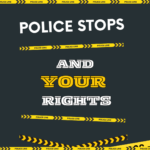tips on safely interacting with police during stops
Knowing your duties, rights, and law enforcement objectives can help you safely navigate an encounter with law enforcement. Below is a brief discussion of things to consider if the police stop you.
step 1: know your duties
Identify Yourself
You must identify yourself if police have probable cause to believe you committed a crime, have a warrant for your arrest, or are in violation of probation or parole.
Provide Your Driver’s License
You must provide your driver’s license if you are pulled over while driving.
Probation or Parole
You must admit that you are on probation or parole if doing so is a condition of your probation or parole.
step 2: know your rights
Remain Silent (5th Amendment)
Except for the duties above, you are not required to respond to questions.
Refuse Search (4th Amendment)
You do not have to allow police to search you, your possessions, or your vehicle, unless submitting to search is a condition of probation or parole.
Ask if You are Free to Leave (4th Amendment)
If you are not free to leave, law enforcement must have a reason for detaining you.
step 3: know the police
Authority
Authority figures do not like signs of disrespect, such as being ignored, or rude, impolite, or offensive behavior.
Crime-fighting
The modern policing focuses on crime-fighting. If police believe you are obstructing or delaying them from this objective, the could arrest you or use force against you.
Armed
Consider that most police are armed and some carry fully automatic assault weapons.
Immunity
Officers are immune to most civil lawsuit and rarely face criminal prosecution or internal discipline. Therefore, police have few if any consequences for harming you or violating your rights.
What Can I Say to Police?
- I respect law enforcement and the job you do.
- However, I am not going to consent to a search of myself, my property, or my vehicle.
- I will not resist you, but I will not consent to my detention, search, or seizure.
- Nor will I answer any questions without my lawyer present.
- With that being said, am I free to leave?
What Can I Do if Police Violated My Rights?
If you can prove police misconduct, the judge could dismiss your criminal case. You could also sue the law enforcement for violating your established constitutional rights.

